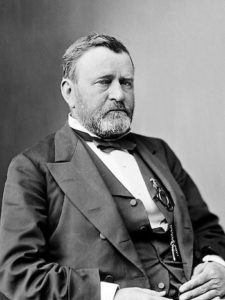
Ulysses Grant
*On this date, in 1822, Ulysses S. Grant was born. He was a white-American soldier and politician.
Hiram Ulysses Grant was born in Point Pleasant, Ohio, to Jesse Root Grant, a tanner and merchant, and Hannah Simpson Grant. Grant's great-grandfather fought in the French and Indian War, and his grandfather, Noah, served in the American Revolution at Bunker Hill. Their son Jesse (Ulysses's father) was a Whig Party supporter and abolitionist. Jesse Grant moved to Point Pleasant in 1820 and found work as a foreman in a tannery. He soon met his future wife, Hannah, and the two were married on June 24, 1821. The boy's name, Ulysses, was drawn from ballots in a hat. Jesse declared the boy Hiram Ulysses to honor his father-in-law, though he would always refer to him as Ulysses.
Raised in Ohio, young Grant possessed an exceptional ability with horses, which served him well throughout his military career. He was admitted to West Point and graduated from the U.S. military academy in 1843. Grant served in the Mexican-American War. In 1848, he married Julia Dent, and they had four children together. Grant abruptly resigned from his army commission in 1854 and returned to his family for seven years.
Grant owned one slave, William Jones, given to him in 1857 by his father-in-law and manumitted by Grant on March 29, 1859. His wife, Julia, had control of four slaves during the war, given to her by her father. All would be freed by the Emancipation Proclamation of 1863 (she chose to free them, even though the proclamation did not apply to her state of Missouri).
During the American Civil War, Grant joined the Union Army in 1861 and led the Vicksburg campaign, which gained control of the Mississippi River in 1863. After Grant's victory at Chattanooga, President Abraham Lincoln promoted Grant to Lieutenant General. Grant fought Robert E. Lee during the high-casualty Overland Campaign and at Petersburg.
On April 9, 1865, Lee surrendered to Grant at Appomattox. A week later, Lincoln was assassinated and was succeeded by President Andrew Johnson, who promoted Grant to General of the Army in 1866. Later, Grant openly broke with Johnson over Johnson’s Reconstruction policies; Grant used the Reconstruction Acts, passed over Johnson's veto, to enforce civil rights for emancipated Blacks. A war hero but a reluctant politician, Grant was unanimously nominated by the Republican Party and was elected president in 1868. As president, Grant stabilized the post-war national economy, created the Department of Justice, and prosecuted the Ku Klux Klan. He appointed Blacks and Jews to prominent federal offices. In 1871, he created the first Civil Service Commission.
The Liberal Republicans and Democrats united behind Grant's opponent in the presidential election 1872, but Grant was handily re-elected. Grant's Native American policy had mixed results. In foreign affairs, the Grant administration peacefully resolved Alabama's claims against Great Britain, but the Senate rejected Grant's prized Caribbean Dominican Republic annexation.
Corruption in his executive branch became notorious: several of Grant's cabinet members and other appointees were fired or had to resign. The Panic of 1873 plunged the nation into a severe economic depression, allowing the Democrats to win the House majority. In the intensely disputed Presidential election of 1876, Grant facilitated the approval by Congress of a peaceful compromise.
In his retirement, Grant was the first president to circumnavigate the world on his tour, meeting with many foreign leaders. In 1880, Grant failed to obtain the Republican presidential nomination for a third term. In the final year of his life, facing severe financial reversals and dying of throat cancer, he wrote his memoirs, which proved to be a significant critical and economic success. Grant was the embattled 18th president who faced the challenge of getting the entire nation to accept the Reconstruction effort. At the time of his death, he was memorialized as a symbol of national unity. Hiram Ulysses Grant died on July 23, 1885.